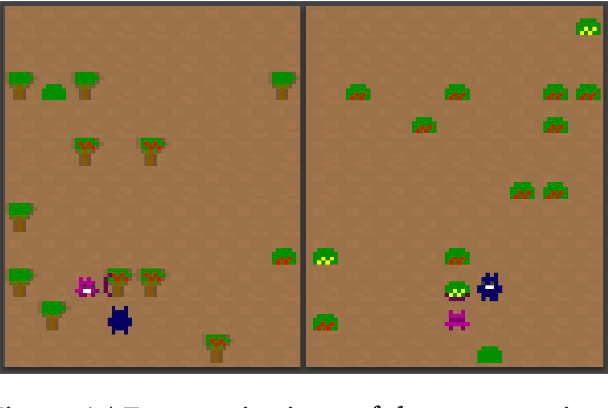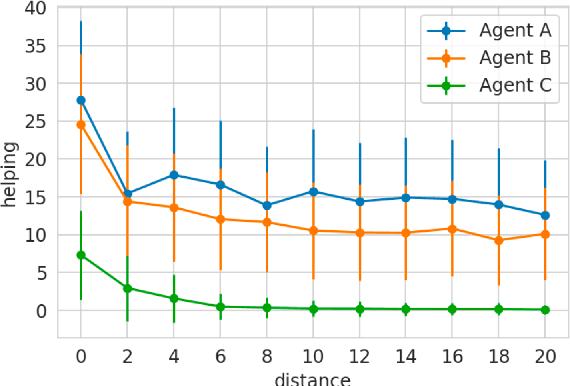Julia Haas
A theory of appropriateness with applications to generative artificial intelligence
Dec 26, 2024

Abstract:What is appropriateness? Humans navigate a multi-scale mosaic of interlocking notions of what is appropriate for different situations. We act one way with our friends, another with our family, and yet another in the office. Likewise for AI, appropriate behavior for a comedy-writing assistant is not the same as appropriate behavior for a customer-service representative. What determines which actions are appropriate in which contexts? And what causes these standards to change over time? Since all judgments of AI appropriateness are ultimately made by humans, we need to understand how appropriateness guides human decision making in order to properly evaluate AI decision making and improve it. This paper presents a theory of appropriateness: how it functions in human society, how it may be implemented in the brain, and what it means for responsible deployment of generative AI technology.
Doing the right thing for the right reason: Evaluating artificial moral cognition by probing cost insensitivity
May 29, 2023


Abstract:Is it possible to evaluate the moral cognition of complex artificial agents? In this work, we take a look at one aspect of morality: `doing the right thing for the right reasons.' We propose a behavior-based analysis of artificial moral cognition which could also be applied to humans to facilitate like-for-like comparison. Morally-motivated behavior should persist despite mounting cost; by measuring an agent's sensitivity to this cost, we gain deeper insight into underlying motivations. We apply this evaluation to a particular set of deep reinforcement learning agents, trained by memory-based meta-reinforcement learning. Our results indicate that agents trained with a reward function that includes other-regarding preferences perform helping behavior in a way that is less sensitive to increasing cost than agents trained with more self-interested preferences.
Melting Pot 2.0
Dec 13, 2022Abstract:Multi-agent artificial intelligence research promises a path to develop intelligent technologies that are more human-like and more human-compatible than those produced by "solipsistic" approaches, which do not consider interactions between agents. Melting Pot is a research tool developed to facilitate work on multi-agent artificial intelligence, and provides an evaluation protocol that measures generalization to novel social partners in a set of canonical test scenarios. Each scenario pairs a physical environment (a "substrate") with a reference set of co-players (a "background population"), to create a social situation with substantial interdependence between the individuals involved. For instance, some scenarios were inspired by institutional-economics-based accounts of natural resource management and public-good-provision dilemmas. Others were inspired by considerations from evolutionary biology, game theory, and artificial life. Melting Pot aims to cover a maximally diverse set of interdependencies and incentives. It includes the commonly-studied extreme cases of perfectly-competitive (zero-sum) motivations and perfectly-cooperative (shared-reward) motivations, but does not stop with them. As in real-life, a clear majority of scenarios in Melting Pot have mixed incentives. They are neither purely competitive nor purely cooperative and thus demand successful agents be able to navigate the resulting ambiguity. Here we describe Melting Pot 2.0, which revises and expands on Melting Pot. We also introduce support for scenarios with asymmetric roles, and explain how to integrate them into the evaluation protocol. This report also contains: (1) details of all substrates and scenarios; (2) a complete description of all baseline algorithms and results. Our intention is for it to serve as a reference for researchers using Melting Pot 2.0.
Ethical and social risks of harm from Language Models
Dec 08, 2021

Abstract:This paper aims to help structure the risk landscape associated with large-scale Language Models (LMs). In order to foster advances in responsible innovation, an in-depth understanding of the potential risks posed by these models is needed. A wide range of established and anticipated risks are analysed in detail, drawing on multidisciplinary expertise and literature from computer science, linguistics, and social sciences. We outline six specific risk areas: I. Discrimination, Exclusion and Toxicity, II. Information Hazards, III. Misinformation Harms, V. Malicious Uses, V. Human-Computer Interaction Harms, VI. Automation, Access, and Environmental Harms. The first area concerns the perpetuation of stereotypes, unfair discrimination, exclusionary norms, toxic language, and lower performance by social group for LMs. The second focuses on risks from private data leaks or LMs correctly inferring sensitive information. The third addresses risks arising from poor, false or misleading information including in sensitive domains, and knock-on risks such as the erosion of trust in shared information. The fourth considers risks from actors who try to use LMs to cause harm. The fifth focuses on risks specific to LLMs used to underpin conversational agents that interact with human users, including unsafe use, manipulation or deception. The sixth discusses the risk of environmental harm, job automation, and other challenges that may have a disparate effect on different social groups or communities. In total, we review 21 risks in-depth. We discuss the points of origin of different risks and point to potential mitigation approaches. Lastly, we discuss organisational responsibilities in implementing mitigations, and the role of collaboration and participation. We highlight directions for further research, particularly on expanding the toolkit for assessing and evaluating the outlined risks in LMs.
 Add to Chrome
Add to Chrome Add to Firefox
Add to Firefox Add to Edge
Add to Edge